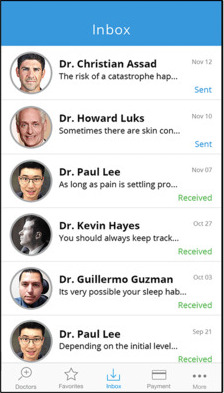 Newport Beach, California-based Curely, which has developed a telehealth app that allows patients to ask physicians health and wellness questions, raised $2 million in a round led by Exponential Partners. Correction: A previous version of this article incorrectly stated that "GE Health's" CIO had invested in Curely.
Newport Beach, California-based Curely, which has developed a telehealth app that allows patients to ask physicians health and wellness questions, raised $2 million in a round led by Exponential Partners. Correction: A previous version of this article incorrectly stated that "GE Health's" CIO had invested in Curely.
Doctors who communicate with patients through the app, which is available for iOS and Android devices, cannot diagnose conditions or prescribe medication for patients, but will answer other questions related to symptoms, follow-up care, or wellness.
The company argues that because doctors on the app do not diagnose or prescribe meds, they also do not have to comply with regulations and geographical limitations. Curely sees this as a benefit -- it currently has nearly 600 board-certified physicians from 17 countries on the app. One of the company's focus areas is connecting people with doctors in other countries, either because that's where they are originally from or because of simple language barriers.
"At our core, we believe reliable health care is a fundamental human right, one that transcends political, socio-economic, and physical borders," Curely CEO Paul Lee said in a statement. "The telehealth industry is projected to grow to $4.5 billion by 2018, and with solutions like Curely, people won't be forced to wait until their situation is urgent to consult a doctor."
Patients can communicate with physicians using a live texting feature that is augmented by IBM's Watson or send physicians a message via an inbox feature. Doctors will respond to those who sent an inbox message within 24 hours or the user will get their money back. Chat and inbox features require less bandwidth, the company explains, so the service is accessible for the 80 percent of the world's population that doesn't have 3G connectivity yet.
Patients can search for physicians by specialty, price, and language. Physicians set their own pricing, which starts at $10 per 12-minute live chat session or $2 per inbox message.
Although Curely said the company is very strict about the verification policy for its doctors, it cannot guarantee the legitimacy of the professionals' credentials or identities of the provided credentials.














